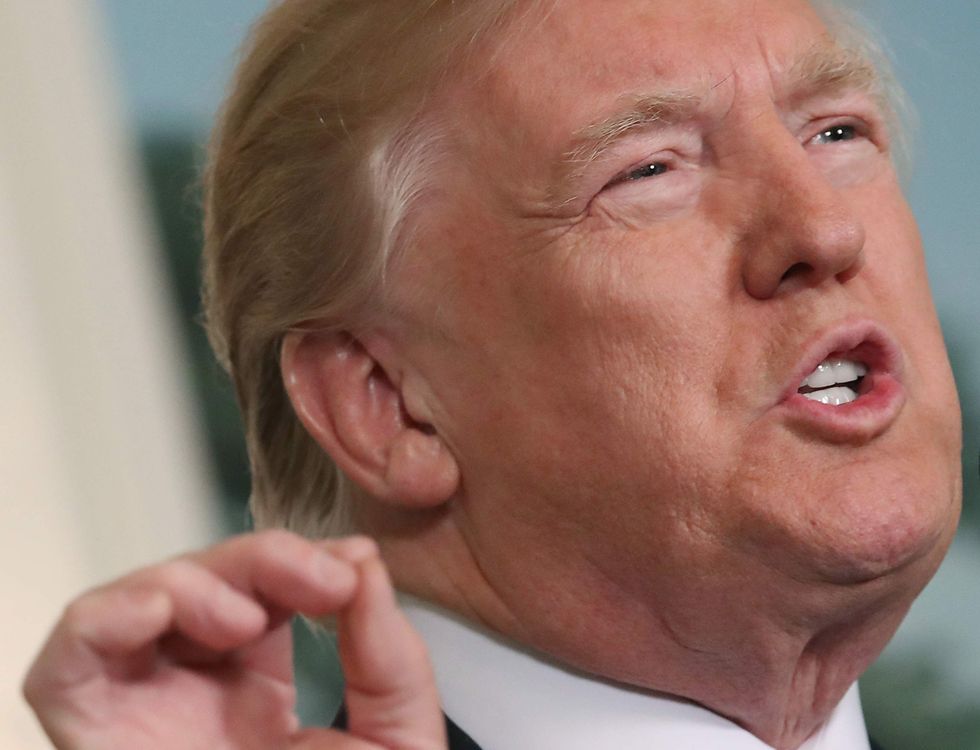
Democratic senators questioned whether President Donald Trump should have the authority to authorize a nuclear strike during a hearing of the Senate Foreign Relations Committee. (Mark Wilson/Getty Images)

Democratic senators attacked President Donald Trump at a Senate Foreign Relations Committee hearing about nuclear authority Tuesday, calling him "unstable" and "volatile" while calling for more checks on his ability to order a nuclear strike.
The hearing wasn't specifically about Trump, but Sen. Chris Murphy (D-Conn.) quickly established that his concerns were about the president.
"Let me just pull back the cover from this hearing," Murphy said. "We are concerned that the president of the United States is so unstable, so volatile, has a decision-making process that is so quixotic, that he might order a nuclear weapons strike that is wildly out of step with U.S. national security interests."
Sen. Ed Markey (D-Mass.) said he didn't believe one person should have the ability to launch a nuclear attack, unless a nuclear attack was first launched upon the U.S., and voiced concern about the provocative rhetoric Trump has used toward North Korean leader Kim Jong Un on Twitter.
"I fear that in the age of Trump, the cooler heads and strategic doctrine that we once relied upon as our last best hope against the unthinkable seem less reassuring than ever," Markey said. "Many Americans share my fear that the president's bombastic words could turn into a nuclear reality."
In January, Markey introduced legislation intended to strip the president of his ability to authorize a nuclear strike without a declaration of war by Congress.
Sen. Jeanne Shaheen (D-N.H.) questioned both Trump's judgment and the ability of the advisers around Trump to guide his decisions.
"We are dealing with a president ... who has not seemed to be willing to accept advice on many issues affecting power," Shaheen said.
The three Democratic senators, along with the other members of the committee, addressed their concerns to C. Robert Kehler, a retired U.S. Air Force general; Peter Feaver, a political science professor at Duke University; and Brian McKeon, a former undersecretary for policy at the Pentagon.
Kehler reminded the committee that a nuclear strike isn't simply something that automatically and immediately happens just because the president orders it.
"This is a system controlled by human beings ... nothing happens automatically," Kehler said. "If there is an illegal order presented to the military, the military is obligated to refuse to follow it."
And, despite common references to "the button," Feaver assured the committee that there is more to a nuclear strike than simply a president's whims.
"The system is not a button that the president can accidentally lean on against the desk and immediately cause missiles to fly as some people in the public, I think, fear it would be."
Finally, McKeon made the case against changing policy or law based on opinions of Trump.
"I think hard cases make bad law, and I think if we were to change the decision-making process in some way because of a distrust of this president, I think that would be an unfortunate precedent," McKeon said.
The legal framework of the president's nuclear authority dates back to shortly after World War II. Based on concerns about the dangers of putting nuclear power in the hands of potentially trigger-happy generals, the Atomic Energy Act of 1946 was signed into law, putting nuclear power in the hands of the civilian executive branch.
The idea is that U.S. citizens should not elect a president who they do not believe can be trusted with the authority to order a nuclear strike, and that the election of a president is an endorsement of his or her qualification to hold such authority.